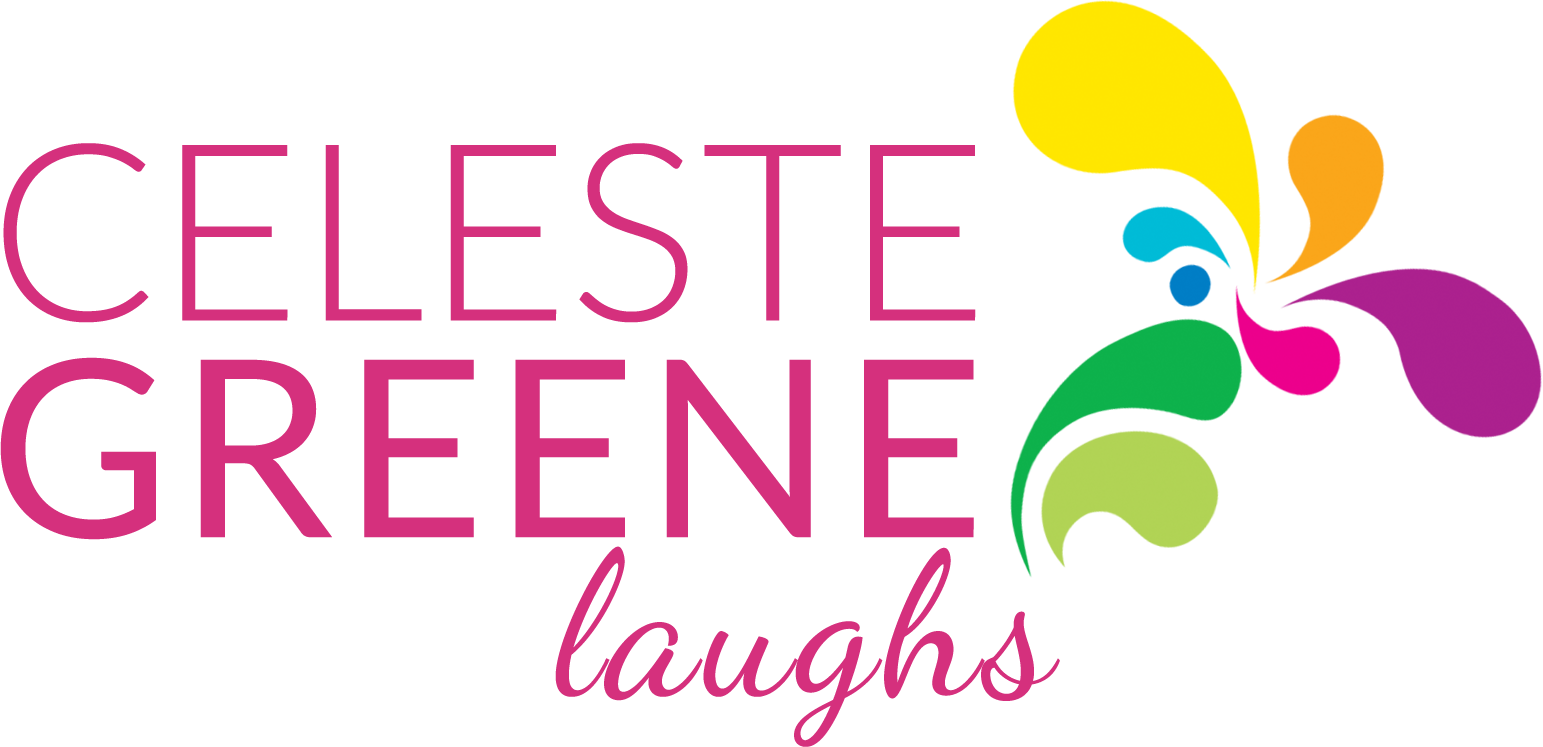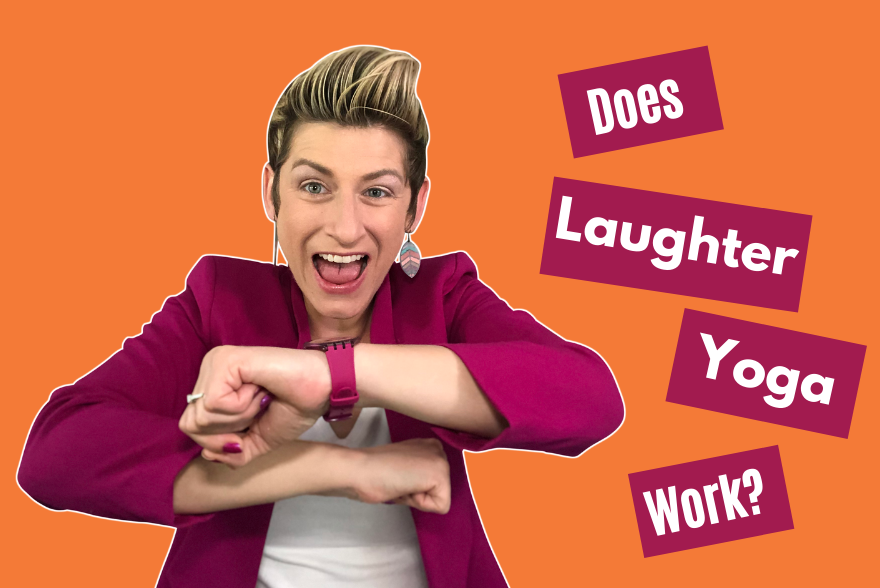The short answer is yes. Laughter Yoga works if you work it. And what do I mean by work it? You’ve got to practice intentional laughter. Even when you don’t feel like laughing. Or worse yet, when you feel like you’ve lost your laugh.
I’ve now been practicing Laughter Yoga for over a decade. I hope this article will give you inspiration to bring more laughter into your life.
When I say that laughter yoga works I mean that laughter — when done intentionally — has incredible mental and physical health benefits. Deep belly laughter shares health benefits similar to aerobic exercise. This is because the diaphragmatic activity of laughing floods the body and brain with fresh oxygen and neurotransmitters (or hormones) associated with the runner’s high – all without running! And what’s best is that you can get all of the benefits of a mild aerobic workout simply by choosing to laugh on purpose and going through the motions of laughing.
So what are the health benefits of laughter anyway?
Physical Health Benefits of Laughter.
Laughter improves respiration and circulation. Just by going through the motions of laughter, we engage in deep inhalation and a full exhalation, which inspires excellent ventilation. That’s right, the physical act of laughter moves the diaphragm up and down. It exercises the lungs and chest muscles, and accelerates the exchange of residual air. Laughter initially boosts the heart rate and blood pressure, which then return to pre-laughter levels, so it brings more oxygen to major internal organs.
Laughter exercises and relaxes muscles. The physical act of laughing exercises the facial, chest, abdominal, gastrointestinal, pulmonary, cardiac, and skeletal muscles. Plus, muscles naturally relax after laughter.
Laughter elevates pain threshold and tolerance. And by raising our pain tolerance, laughter helps ease painful symptoms among the numerous people who suffer from chronic conditions. This was first documented Norman Cousins in his novel Anatomy of Illness. In the novel, Cousins describes his use of intentional laughter in easing symptoms of his ankylosing spondylitis, a painful collagen illness that rendered him immobile.
Laughter Increases immune system defenses. The physical act of laughing regularly stimulates the immune system’s ability to fight viral and bacterial infections. Who would have thought that it could be as easy as a few giggles to fight off the common cold?!?
Mental Health Benefits of Laughter
Laughter reduces stress and tension. Illnesses are negatively impacted by stress. Laughter unwinds the negative effects of stress by reducing stress making hormones in the blood. Laughing gives us the breathing space we need to release tension and to keep a positive outlook. This breathing room gives us a more positive perspective and we are more likely to see the bright side of a situation.
Laughter reduces anxiety, depression, and feelings of isolation. I personally have experienced periods of anxiety and depression in my life. During these times I have used laughter to help break the cycle of the negative thoughts that swim through my mind when I’m feeling anxious or depressed. Attending online Laughter Clubs and laughing with my global laughter community on Zoom has helped me to feel less isolated and more connected.
Laughter enhances memory, creative thinking, and problem-solving. Laughter increases hormones in the body, which improve overall mental functioning. When we laugh regularly will experience increased interpersonal responsiveness, alertness, and memory. Positive emotions help us organize new information, keep that information in the brain longer, and retrieve it faster later on. Think of the edge this gives us in our daily life? Who wouldn’t want to see out-of-the-box solutions, spot opportunities, and better see how we can build upon the ideas of others?!
Laughter improves interpersonal interactions and increased friendliness, helpfulness and sense of group identity Laughter releases high concentrations of hormones that are related to feelings of happiness, bonding, tolerance, generosity, and compassion. This improves relationships and builds group identity, cohesiveness, and solidarity. Danish comedian and pianist Victor Borge is famously quoted for saying, “Laughter is the shortest distance between two people.” That’s because laughter builds up a sense of closeness to others helping us to see that there are fewer differences and more similarities among us.
It elevates mood and overall feelings of well-being such as self-esteem, hope, energy, and vigor. People who experience positive emotions more frequently are shown to exhibit higher levels of confidence, optimism, and self-efficacy; likability; sociability, activity, and energy; prosocial behavior; immunity and physical well-being. They are more flexible and effective in coping with challenge and stress.
A key indicator of happiness is the experience of frequent positive emotions. This is called positive affect. One thing we have in common is that we all wish to be happy. Think about it. Is there anybody that doesn’t want to be happy?! No, we all want to experience pleasant feelings and avoid unpleasant feelings. Laughter is a tool that we can use to develop our sense of happiness within ourself and also to share in joyful feelings with others.
In studies, happy respondents rate themselves higher in global health and report higher levels of social and physical functioning and lower levels of pain, relative to their less happy peers. It’s demonstrated that happy people are more successful than their less happy counterparts in work, relationships, and health. Happiness creates these outcomes. It is not other way around. We don’t experience happiness as an outcome of success.
Get laughing, get happy. Easier said than done you may think.
You may even ask, “How can I laugh when nothing seems funny and I feel like I’ve lost my sense of humor?”
How Can I Laugh if Nothing is Funny?
Ten years ago I discovered that we can choose to laugh. We don’t have to be happy in order to laugh. We don’t need something funny to happen in order to laugh. We can simply choose to laugh. We can just laugh. And what’s more is that just by going through the motions of laughter, we can improve our mood and many other aspects of our health and wellbeing.
It’s called Laughter Yoga. What is Laughter Yoga you ask? Laughter Yoga is a health concept in which you can laugh without jokes, humor, or comedy. It’s based on scientific evidence that genuine and self-simulated laughter elicit similar health benefits. In Laughter Yoga sessions, participants initially choose to laugh and purposefully initiate laughter as exercise in a group setting. Through making eye-contact and enacting a sense of childlike playfulness, self-simulated laughter becomes genuine and contagious. Laughter Yoga combines laughter exercises with deep breathing. Intentional deep breathing is interspersed throughout the Laughter Yoga session.
Laughter itself is a combination of inhalations and exhalations. So the diaphragmatic motion of the laughter used in the laughter exercises mimics deep breathing. The Laughter Yoga practice was established in 1995 by an Indian medical physician named Dr. Madan Kataria. At present, Laughter Yoga is practiced in over 100 countries worldwide … and the trend is growing.
Try This Laughter Yoga Exercise
The first step in laughing more is simply choosing to laugh. And choosing to laugh can be as simple as making a decision to make laughing sounds even when you feel don’t feel like laughing. Try it now. Say out loud “Ho, Ho!” Now say “Ha, Ha!” And repeat. Move the hands outward from the chest as you chant “Ho, Ho” and move the hands downward as you chant “Ha Ha!” Repeat as many times as you like. You can even get funky and move to your own rhythm as you chant “Ho Ho, Ha Ha!” Really get your heart rate up! You can take a breathing break in between chants. Breathe in and breathe out. And repeat. If you aren’t worried about what people think. (And you shouldn’t be. You are awesome). You may even try walking briskly while extending the
If it’s difficult for you to practice like this at first, that’s okay. Just know that the more you laugh, the more you are able to laugh. At first you may just have to go through the motions. And that’s okay.
Laugh Along with Me in This 5-Minute Laugh-Along Video


